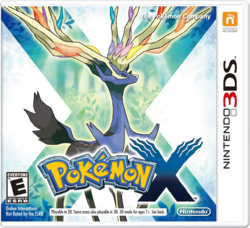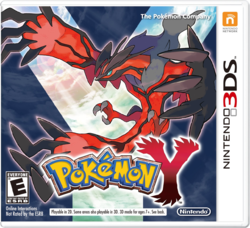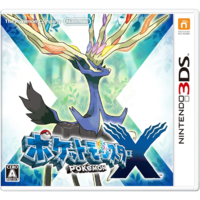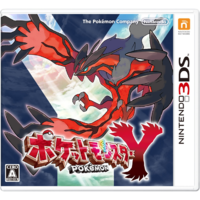Pokémon X and Y: Difference between revisions
No edit summary |
m (→Features) |
||
| Line 51: | Line 51: | ||
===3D compatible gameplay=== | ===3D compatible gameplay=== | ||
Unlike previous games in the main series, Pokémon X and Y feature a three dimensional style of gameplay, and 3D modeled characters and creatures are used, rather than sprites like has always been done in the main series. In addition, the games still feature 2D elements of gameplay. The battle system is aesthetically overhauled, featuring more lively reactions to the attacks, such as when a Pokémon is being hit. | Unlike previous games in the main series, Pokémon X and Y feature a three dimensional style of gameplay, and 3D modeled characters and creatures are used, rather than sprites like has always been done in the main series. In addition, the games still feature 2D elements of gameplay. The battle system is aesthetically overhauled, featuring more lively reactions to the attacks, such as when a Pokémon is being hit. | ||
===Move Name Formatting=== | |||
Some moves, such as Thunder Shock, are now differently formatted. In Generations V and earlier, the move was named "Thundershock". In Generation VI, however, it is Thunder Shock. Other moves have also been reformatted. | |||
===Transportation=== | ===Transportation=== | ||
Revision as of 18:34, 23 November 2013
- Pokémon X redirects here. For other uses, see Pokémon X (disambiguation).
| Pokémon X ポケットモンスターX | |
|---|---|
 Pokémon X's boxart, featuring Xerneas | |
| Pokémon Y ポケットモンスターY | |
 Pokémon Y's boxart, featuring Yveltal | |
Basic info
| |
| Platform: | Nintendo 3DS |
| Category: | RPG |
| Players: | 1-4 players simultaneous |
| Connectivity: | None |
| Developer: | Game Freak |
| Publisher: | Nintendo/The Pokémon Company |
| Part of: | Generation VI |
Ratings
| |
| CERO: | A |
| ESRB: | E |
| ACB: | PG |
| OFLC: | PG |
| PEGI: | 7 |
| GRAC: | ALL |
| GSRR: | N/A |
Release dates
| |
| Japan: | October 12, 2013[1] |
| North America: | October 12, 2013[2] |
| Australia: | October 12, 2013[3] |
| Europe: | October 12, 2013[4] |
| South Korea: | October 12, 2013[5] |
| Hong Kong: | N/A |
| Taiwan: | N/A |
Websites
| |
| Japanese: | Official Japanese site |
| English: | Official English site |
|
Japanese boxart
| |
Pokémon X (Japanese: ポケットモンスターX Pocket Monsters X) and Pokémon Y (Japanese: ポケットモンスターY Pocket Monsters Y) are the primary paired versions of Generation VI. The games are available on the Nintendo 3DS. The games take place in the new Kalos region.
Both games were revealed during a worldwide announcement by Satoru Iwata through Nintendo Direct at 8 pm JST, on January 8, 2013. The paired versions were released worldwide (except for select countries) on October 12, 2013 and are available for both retail sale and download.[6] All copies of the game are playable in all seven of the languages that the Pokémon games are released in: Japanese, English, German, Spanish, French, Italian, and Korean.
Features
3D compatible gameplay
Unlike previous games in the main series, Pokémon X and Y feature a three dimensional style of gameplay, and 3D modeled characters and creatures are used, rather than sprites like has always been done in the main series. In addition, the games still feature 2D elements of gameplay. The battle system is aesthetically overhauled, featuring more lively reactions to the attacks, such as when a Pokémon is being hit.
Move Name Formatting
Some moves, such as Thunder Shock, are now differently formatted. In Generations V and earlier, the move was named "Thundershock". In Generation VI, however, it is Thunder Shock. Other moves have also been reformatted.
Transportation
Players can now walk on an 8 directional grid, allowing diagonal movement, as opposed to the four way grid in previous games.
The player now has the ability to rollerskate, at least under certain conditions, and have been shown to allow the player to grind and overcome obstacles. Skiddo, Mamoswine, and Rhyhorn can be ridden in certain locations and allow the player to interact with the environment, by destroying rocks and crossing broken paths. Gogoat can also be ridden, although only around Lumiose City in a set path.
Player Search System
- Main article: Player Search System
The Player Search System (PSS) is a multiplayer feature that allows people to connect, battle, and trade with other players through the internet. It uses the bottom screen and allows the player to search for other people playing both globally and locally.
Pokémon-Amie
- Main article: Pokémon-Amie
Pokémon-Amie is a new feature that allows the player to develop stronger bonds with their Pokémon. It uses the touch screen to allow players to pet, feed, and play with Pokémon currently on their team. Players may interact with their Pokémon by petting or feeding them via the touchscreen or mimicking their movements using the camera.
Sky Battles
- Main article: Sky Battle
Sky Battles are battles which are restricted to Flying Pokémon, although some Pokémon with Levitate can enter. These airborne battles take place against Trainers standing far away, such as on cliffs.
Horde Encounters
- Main article: Horde Encounter
It is now possible to encounter several wild Pokémon at once. Up to five wild Pokémon will battle against one of the player's Pokémon. These battles offer a lot of experience. Some attacks, such as Rock Slide, are shown to hit all five of the opposing Pokémon. However, after the player's turn, their Pokémon must withstand attacks from all five of the opposing Pokémon.
Super Training
- Main article: Super Training
Super Training is a new method of quickly and easily increasing a Pokémon's EVs.
New type
- Main article: Fairy (type)
One new type has been introduced, the Fairy type. This type was added to balance the Dragon type, which was previously only weak to itself and Ice. Fairy-type attacks are strong against Dragon, Fighting, and Dark types and resisted by Fire, Poison, and Steel types; Fairy-type Pokémon are weak to Poison- and Steel-type attacks, resist Fighting-, Bug-, and Dark-type attacks, and are immune to Dragon-type attacks.
Trainer customization
- Main article: Trainer customization
The player will now be able to change their appearance in-game, allowing them to customize their characters by changing their hair color and clothing.
Gyms
X and Y feature Gyms just as every other main series title. In Kalos, the Gym Leaders are Viola (Bug), Grant (Rock), Korrina (Fighting), Ramos (Grass), Clemont (Electric), Valerie (Fairy), Olympia (Psychic), and Wulfric (Ice).
Elite Four and Champion
Just as in Unova, the Elite Four can be battled in any order. After battling all four, a path to the Champion is unlocked. The Elite Four members are Wikstrom (Steel), Malva (Fire), Drasna (Dragon), and Siebold (Water). After beating all four Elite Four members, the player will face the Champion, Diantha, who uses a variety of types along with a Gardevoir which can Mega Evolve.
Pokémon
69 new Pokémon were introduced for X and Y, bringing the known total from 649 to 718.
The first Pokémon to be revealed were Chespin, Fennekin, Froakie, Xerneas, and Yveltal on January 8, 2013.
Mega Evolution
- Main article: Mega Evolution
A unique state, Mega Evolutions are available exclusively in battle and allow for a temporary boost in stats, in some cases changing their Abilities and types. The ability to Mega Evolve will not be available to all Pokémon. The Pokémon can transform if it is holding a Mega Stone in battle, once the Trainer has a Mega Ring and a Key Stone in his or her possession.
Version-exclusive Pokémon
|
| ||||||||||||||||||||||||||||||||||||||||||||||||||||||||||||||||||||||||||||||||||||||||||||||||||||||||||||||||||||||||||||||||||||||||||||||||||||||||||||||||||||||||||||||||||||||||||||||||||||||||||||
Gallery
References
- ↑ Japanese Pokémon X and Y minisite (Japanese)
- ↑ Pokémon.com (US)
- ↑ Nintendo Australia
- ↑ Pokémon.com (UK)
- ↑ Korean Pokémon X and Y minisite (Korean)
- ↑ 『ポケットモンスター X・Y』ニンテンドー3DSで2013年10月、世界同時発売【画像追加】 (Japanese)

|
This game-related article is part of Project Games, a Bulbapedia project that aims to write comprehensive articles on the Pokémon games. |














































